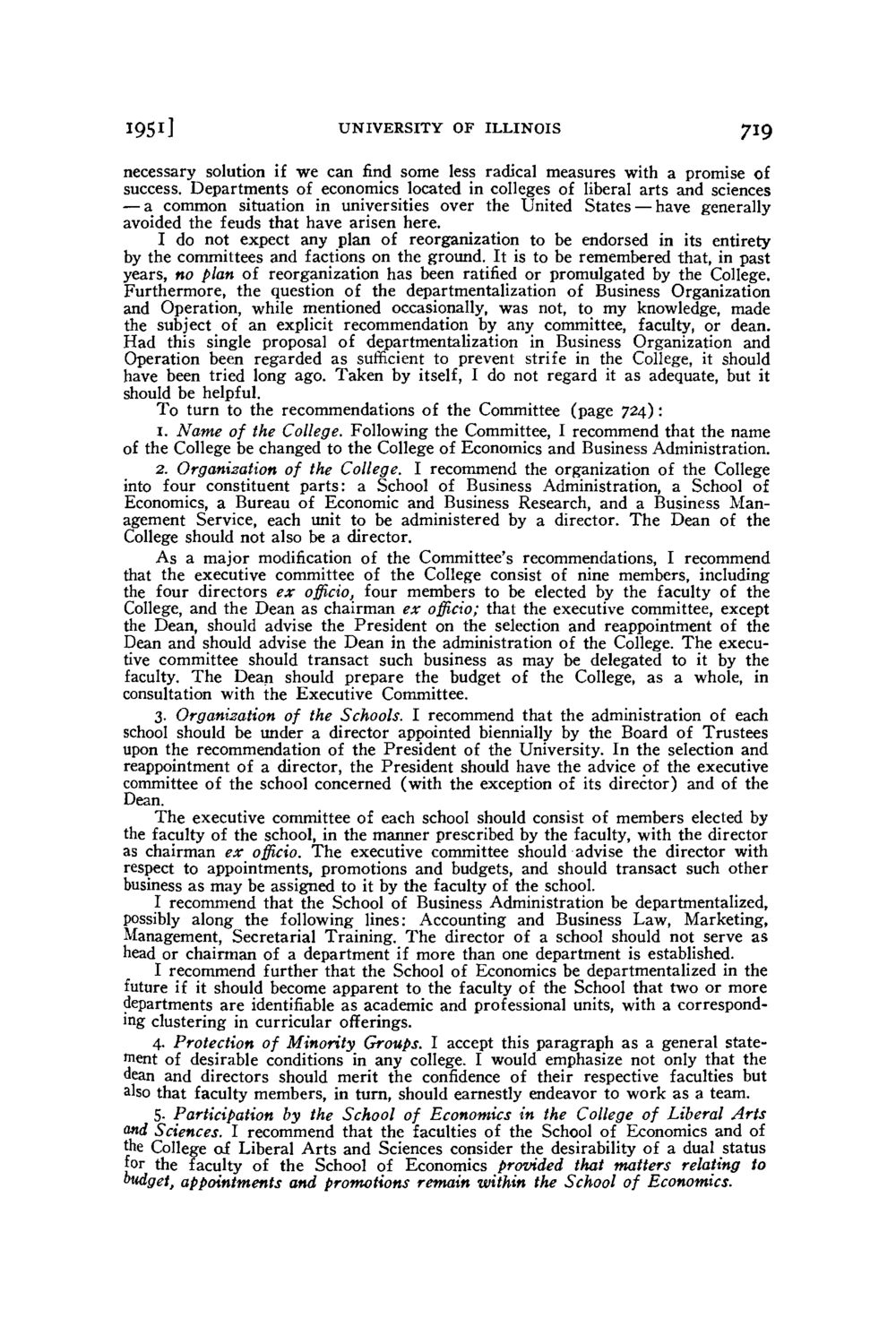| |
| |
Caption: Board of Trustees Minutes - 1952
This is a reduced-resolution page image for fast online browsing.

EXTRACTED TEXT FROM PAGE:
i95i] UNIVERSITY OF ILLINOIS 719 necessary solution if we can find some less radical measures with a promise of success. Departments of economics located in colleges of liberal arts and sciences — a common situation in universities over the United States — have generally avoided the feuds that have arisen here. I do not expect any plan of reorganization to be endorsed in its entirety by the committees and factions on the ground. It is to be remembered that, in past years, no plan of reorganization has been ratified or promulgated by the College. Furthermore, the question of the departmentalization of Business Organization and Operation, while mentioned occasionally, was not, to my knowledge, made the subject of an explicit recommendation by any committee, faculty, or dean. Had this single proposal of departmentalization in Business Organization and Operation been regarded as sufficient to prevent strife in the College, it should have been tried long ago. Taken by itself, I do not regard it as adequate, but it should be helpful. To turn to the recommendations of the Committee (page 724): 1. Name of the College. Following the Committee, I recommend that the name of the College be changed to the College of Economics and Business Administration. 2. Organization of the College. I recommend the organization of the College into four constituent parts: a School of Business Administration, a School of Economics, a Bureau of Economic and Business Research, and a Business Management Service, each unit to be administered by a director. The Dean of the College should not also be a director. As a major modification of the Committee's recommendations, I recommend that the executive committee of the College consist of nine members, including the four directors ex officio, four members to be elected by the faculty of the College, and the Dean as chairman ex officio; that the executive committee, except the Dean, should advise the President on the selection and reappointment of the Dean and should advise the Dean in the administration of the College. The executive committee should transact such business as may be delegated to it by the faculty. The Dean should prepare the budget of the College, as a whole, in consultation with the Executive Committee. 3. Organization of the Schools. I recommend that the administration of each school should be under a director appointed biennially by the Board of Trustees upon the recommendation of the President of the University. In the selection and reappointment of a director, the President should have the advice of the executive committee of the school concerned (with the exception of its director) and of the Dean. The executive committee of each school should consist of members elected by the faculty of the school, in the manner prescribed by the faculty, with the director as chairman ex officio. The executive committee should advise the director with respect to appointments, promotions and budgets, and should transact such other business as may be assigned to it by the faculty of the school. I recommend that the School of Business Administration be departmentalized, possibly along the following lines: Accounting and Business Law, Marketing, Management, Secretarial Training. The director of a school should not serve as head or chairman of a department if more than one department is established. I recommend further that the School of Economics be departmentalized in the future if it should become apparent to the faculty of the School that two or more departments are identifiable as academic and professional units, with a corresponding clustering in curricular offerings. 4. Protection of Minority Groups. I accept this paragraph as a general statement of desirable conditions in any college. I would emphasize not only that the dean and directors should merit the confidence of their respective faculties but also that faculty members, in turn, should earnestly endeavor to work as a team. 5- Participation by the School of Economics in the College of Liberal Arts ond Sciences. I recommend that the faculties of the School of Economics and of the College of Liberal Arts and Sciences consider the desirability of a dual status for the faculty of the School of Economics provided that matters relating to budget, appointments and promotions remain within the School of Economics.
| |